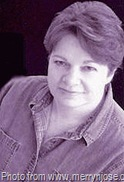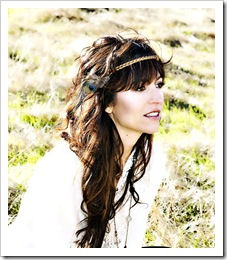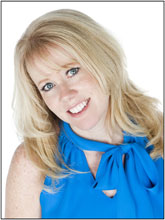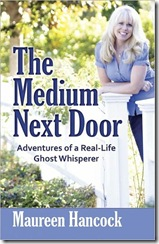October 25, 2010

Jewelle St. James and I have a lot in common. Many years ago, as a wife and mother, Jewelle was merely going through the motions of life when something supernatural and unexpected happened to her involving a famous rock star. It forever changed her life.
It was 1980. World-legendary rock musician John Lennon of The Beatles had just been murdered and Jewelle, who wasn’t even a Lennon fan, was suddenly overcome by a grief so overwhelming that it consumed her entire life. Then strange things began happening. It made no sense; what was going on? Confused and concerned about her sanity, she set out in search of explanations.
What she discovered blew her mind.
Like me, Jewelle learned that she had shared a past life with a famous musician whose spirit was the driving force leading her on her journey to self-discovery. And like me, she fought against the otherworldly truths that were being revealed to her. Why? Well, for one thing, because it was preposterous!
Although Jewelle and I present slightly different angles with our stories (each person’s journey is tailored to his or her specific requirements for spiritual growth), she and I share the insatiable need to let the world know that there is so much more to life than what’s on the surface. We want others to keep their minds and their hearts open because you never know where your truths may be found. I wonder how many have had spiritual awakenings through Elvis? More on this in another post…
But truth is truth in any form, and it is my belief that we all recognize truth when we encounter it even though sometimes our logical brains tell us we’re being ridiculous.
Jewelle’s book, All You Need Is Love: A Past Life with John Lennon, is about her search for truth. It’s about reincarnation and the discovery of self through that means. Her story will assure you that love never dies and that underneath it all, love is truly all you need…
Following is our interview. My words are in italics.
P: Hi Jewelle, thank you for taking your time to reach out to others by granting me this interview. I’d like to begin by asking you what made you want to write about your experience.
J: Thank you Pat, for requesting this interview. I believe that my experience was meant to be shared, to be a voice of many, sharing personal metaphysical experiences. I hope to contribute to worldwide investigations into the concept of past lives and how they affect our present lives.
P: You’ve demonstrated that by accepting the reality of our past lives, it can help us heal in our present lifetime. Even from wounds we may have been unaware of where they came from. For instance, maybe a man has an inexplicable fear of starving, so he eats too much and although he knows it’s not good for him, he can’t seem to stop himself.
J: Yes. The evidence of past lives sometimes emerges as unexplainable patterns in our current lives screaming for attention and healing. A favorite quote: “If you want to know your past, look at your present life. If you want to know your future, look at your present life.”
P: You also talk a little about the philosophies you discovered, such as “love is really all there is…” and “The soul is able to see all…” “We write our life script before we’re born and later we’re amazed when the right people and the right circumstances enter our lives when really, we’ve arranged it all ourselves…”
How did all these philosophies affect you? Did they make you want to explore them further?
J: These philosophies have given me much peace of mind and a knowing that there is a grand design in each of our lives. I am currently exploring more, but it’s a delicate balance. One cannot force spiritual understanding, it unfolds in its own time and yet clues are always present. This is my experience anyway.
P: Don’t ever give up! You also wrote that your sister’s spirit told you, “We think our lives are separate; it’s all one play, one picture…Tell your story so others can see where their lives are; what is their big picture, for the big picture is the only picture…”
This is exactly what I “saw” when I had my mystical experience—how everything is connected.
J: My other book, Jude: My Reincarnation from Auschwitz came about because of a memory since childhood but I didn’t think of it as a past life, it was just a part of me, like my arm or whatever.
After All You Need Is Love was written, a channeled poem (about the Holocaust) came to me in a short two minutes, and believe me I’m no poet! The poem became a guidepost in discovering my last life ending in Auschwitz.
When I visited Auschwitz in Poland, and gazed across the snowy quiet Auschwitz-Birkenau where millions of Jews had died, there was a split second where I understood that all time is one. Later it was hard to wrap my head around that concept, but for those several seconds, I understood.
P: And that’s how it happened to me too—in a matter of several seconds, I understood. The trick then becomes how do we hold onto it and incorporate it into our daily lives?
J: “Peace that passeth all understanding.” For me that quote means having faith in the unseen and the extraordinary spiritual events that endlessly flow. It took me a long time and a lot of tears to get to that point.
P: You also said that it was John Lennon’s guidance that kept you going on your search, allowing you to learn more about yourself in the process—that he was a major player in your lessons and without him, you wouldn’t have learned so much. It’s a spiritual connection. How can one know when this is real and not just imagined? i.e. a fan inventing a connection to a celebrity?
J: I was never a Beatles fan, yet I grieved for John Lennon as if I’d known him. This was the core of my confusion and for years, no one was more skeptical than me. The fact that he was a rock star made me go to the ends of the earth to truly receive the truth one way or the other. I always say, if he’d been the next door neighbor I wouldn’t have had a problem in accepting the explanation that I knew him in another life. To this day (in my mind) it’s John Baron guiding me, although I’m positive Lennon and Baron are the same soul. John Baron was the man I knew and therefore I am more comfortable with his spiritual guidance. However, there have been unexplainable communications concerning Lennon, not Baron, that have taken decades to process and accept.
P: You mention how you constantly doubted and even when you asked for signs to verify things and they were given to you, you still doubted. You even doubted your experience. I did the same thing. How can a person avoid this doubting? Because it’s times like that, that often cause us to give up and go right back to our old ways of doing things. Then of course, we don’t grow.
J: It’s healthy to doubt when you’re dealing with the unknown, I believe. Many times I tried to ignore it all. It wasn’t until ten years ago, that I reached a point when the synchronicities and discovering the relevant ancient records, to name only two, were so overwhelming that I could no longer argue with my own evidence. Then I finally surrendered. It was a spiritual moment that could have only unfolded in its correct time. I accepted the love that is obviously guiding in my life.
P: That must have been an immensely comforting revelation—to finally be able to accept it completely. In your book, you wrote, “All of it has always been real…”
J: For so long I lived in a place of frozen confusion. It’s taken nearly thirty years to truly understand that my story is real and meant to be shared—that it’s my life’s mission—yet there are aspects of my journey that I will never understand.
P: I love how you say, “We don’t have to completely understand something to believe it’s real.” How do you know this?
J: My Auschwitz-Birkenau experience of clearly seeing that all time, and all peoples are one, was a major turning point in accepting the wonders of life although paradoxically it was beyond my rational understanding.
P: Getting back to the beginning of your story. Can you describe your initial experiences and what it was that lead you to investigate John Lennon?
J: My initial reaction to John Lennon’s death was an instant debilitating grief that lasted for three years. When I finally received a possible reason for my pain (that I had loved and lost him in another life in southern England), it gave me a focus, and a way to try to eliminate that pain. This focus resulted in twenty years of research and investigation.
P: That’s a long time! Do you think the way you were raised may have affected what happened to you?
J: I was raised to (spiritually) keep an open mind so therefore was finally able to seek guidance from my psychic mother and sister (although that still took me years to request their help).
P: Do you consider yourself a religious person?
J: I believe in God but am not connected to any church or religion.
P: Can this sort of thing happen to someone who isn’t spiritual?
J: Although I was from a spiritual type family, when John Lennon died, I was 27 years old, a young wife and mother. My head-space wasn’t exactly into understanding my grief over his death let alone what the reason could be. So, if someone else were in my shoes, spiritual or not, the same confusion and pain would exist, I believe.
P: Even someone who doesn’t believe in reincarnation?
J: Initially my opinion/understanding of reincarnation was neutral, it held no interest to me one way or the other so if applied to someone else, it would be a matter of their personal need, or not, to investigate and receive answers.
P: Do you consider yourself psychic? Have your psychic abilities grown since this experience?
J: I feel I’m intuitive but could not give anyone a psychic reading! My awareness has grown but maybe that comes with age and wisdom?
P: And perhaps with a little help from your friends not in physical form? You wrote that John’s spirit told you, “The consciousness of the planet can be raised through the arts.” You also wrote that John’s spirit told you that your job was to keep his memory alive so people would remember the messages he tried to relate to the world through his music… This is an aspect of your relationship with John Lennon and NOT John Baron.
J: You’re right! For years, I only accepted John Baron… Baron’s incarnation as Lennon has been a major stumbling block for me. I just couldn’t grasp that. But those were in the early years—now I understand our many lives, and if a famous life gets thrown into the mix, not to turn away because of my human-based doubts.
P: I went through the same thing, worrying that I was allowing myself to be misled by Sammy’s fame and the sheer excitement of the world of rock ‘n’ roll instead of focusing on the underlying message that was revealed to me. And yet, for me, it’s all tied together. I even found myself writing in my book about how John Lennon said, “when the real music comes to me, the music of the spheres, I am just a medium to relay its message…”
J: I believe all artists channel from a Universal Source. Parts of All You need Is Love were channeled, like someone was “giving” me the sentences, someone from an outside source.
P: Since Lennon was a musician, do you think that part may have played a role? The music part? Because that’s how it all happened to me—through music. Music is a language that transcends barriers between people. Maybe even the barriers of time and death. Recently, I heard Paul McCartney say that “Yesterday” just came to him, as if through a supernatural source.
J: The musical combination of Paul McCartney and John Lennon was pure heavenly brilliance. My personal belief is that John Lennon was a Universal spokesperson, one of many messengers disguised as musicians, and through his gift of music, and long after we are all gone, the music will survive and heal and bring joy.
P: What have others told you they’ve gotten out of reading your story?
J: After reading All You Need Is Love, many have expressed a comfort of knowing love cannot die, nor can our souls.
P: What a beautiful message of hope this is.
J: Your body will whither and die but the spirit lives forever and lost loves never leave us.
P: What was the most difficult part of your journey?
J: The emotional feelings of pain and loss felt through those early years and then mustering the courage to write about my experience.
P: I don’t think many people realize what it takes to write something like this and especially to put it out there to the world in a book! What else did your journey teach you?
J: That every day, in ever way, we are guided, that we are connected to the Divine and to each other, that we all matter, we are all part of an intricate Universal design.
P: Thank you, Jewelle, for being a light in the lives of so many by sharing your story.
J: Thanks, Pat, to you and your readers for your interest.

Jewelle St. James has written several books and articles on reincarnation. For more information, please visit her website at http://www.pastlifewithjohnlennon.com/
Her candid stories continue to enlighten and inspire people all over the world.
Do you think you may have had a past life? Jewelle writes about how to begin your search for answers in “Clues to Our Past Lives.” Read her full article at http://www.merrynjose.com/artman/publish/article_316.shtml (Link provided by permission.)
The other day, a man I’d never met before asked me what my book was about.




